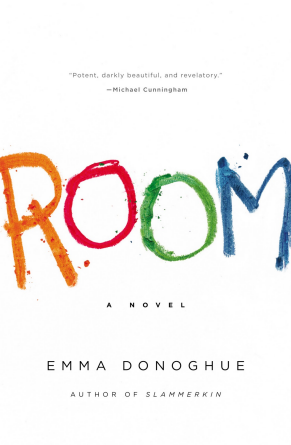By Leanna Pankratz (The Cascade) – Email
Print Edition: March 14, 2012
 Five-year-old Jack wakes up from “Bed,” brushes his teeth at “Sink,” and maybe, just maybe turns on “TV” to watch the funny pictures inside, as long as it doesn’t “rot his brain” too much, like Ma says it will.
Five-year-old Jack wakes up from “Bed,” brushes his teeth at “Sink,” and maybe, just maybe turns on “TV” to watch the funny pictures inside, as long as it doesn’t “rot his brain” too much, like Ma says it will.
Jack lives with his mother in an 11×11 room, where they play, laugh and learn together. This is Jack’s world, and here he is stimulated to learn and try new things. He was born here, has never left, and is comfortable in his safe, warm environment where all objects take on characters, and his mother loves him.
As the novel progresses, however, readers and Jack learn that the room isn’t the safe-haven he once thought it was. His mother is not here out of choice, and there is a man named Old Nick who holds the key to the locked door, and is the providing hand behind the sparse boxes of cereal and bananas that show up on “Counter” from time to time. The room, to readers, takes on a new claustrophobic light as a prison, and we are plunged into Jack and Ma’s increasing urgency to get out. They cook up a plan, but what will life be like on the outside, where things are cold and too bright?
Room is a very authentic novel in its presentation of a young boy’s assessments of the world around him. The novel is notably written in a vernacular that would be common to a five-year-old. Due to Jack’s lifelong isolation and obvious familiarity with “The Room,” objects such as “Door” and “Floor” are presented and addressed throughout the novel in personified forms.
The very specific nature of the Room’s narrative may turn off some readers who may find Jack’s voice hard to decipher or grow tired of wading through personified objects and dropped pronouns. However, in my opinion, and the opinion of countless other reviewers, the complicated narrative only further fleshes out the story and makes it authentic in a way that perfect grammar and an Oxford vocabulary could not. I find that the use of first person and five-year-old vernacular allows readers to feel closer to Jack; the language endears readers to him.
This is a novel ripe with child psychology. Readers are invited to look deeper than the superficial storyline and Jack’s perceptions of events into the truly dark situation that he and his mother deal with at the hands of Old Nick, and their eventual emancipation from “The Room.” The novel deals with themes of abduction, confinement, isolation, and abuse, and it does so with tenderness and understanding towards its own characters – a testament to Emma Donoghue’s skill as a writer.
The novel is informative, startling, sweet and very, very strong. Donoghue’s treatment of the subject matter is direct, but not explicit, and showcases the effects of such a situation on a child and young woman in a subtle yet clear way, rather than gratuitously spoon-feeding the readers graphic descriptions of the trouble at hand. In this regard, I feel that Donoghue has succeeded the most in the careful, knowledgeable and riveting telling of a story that requires delicate communication and a strong research background into the field of child psychology. This feat she has undoubtedly achieved and is attested to in her “Thank-You’s” where she sends her post-publication gratitude out to the many child psychologists who have helped her along the way.
This isn’t a scary novel in its delivery, but the subject matter suggests something conceivably a lot darker than readers are let onto. While Jack is the story’s hero in many ways, a reader’s eye will also be drawn to his mother – a paragon of love and bravery as she deals with and fights against her lot in life. In spite of her circumstances, she has created a comfortable, stimulating life for Jack in “The Room.” This brings us to the conclusion that the story is as much about Jack’s mother as it is about Jack – a fact that Donoghue captures beautifully through the bright eyes of a five-year-old, and treats with the respect a story like this deserves. Room is not a novel to pick up and throw away, nor a casual “beach read,” but a readable pseudo-study of the effects that big, horrible events have on a child, and the resilient spirit of mother and son that overcome them.

